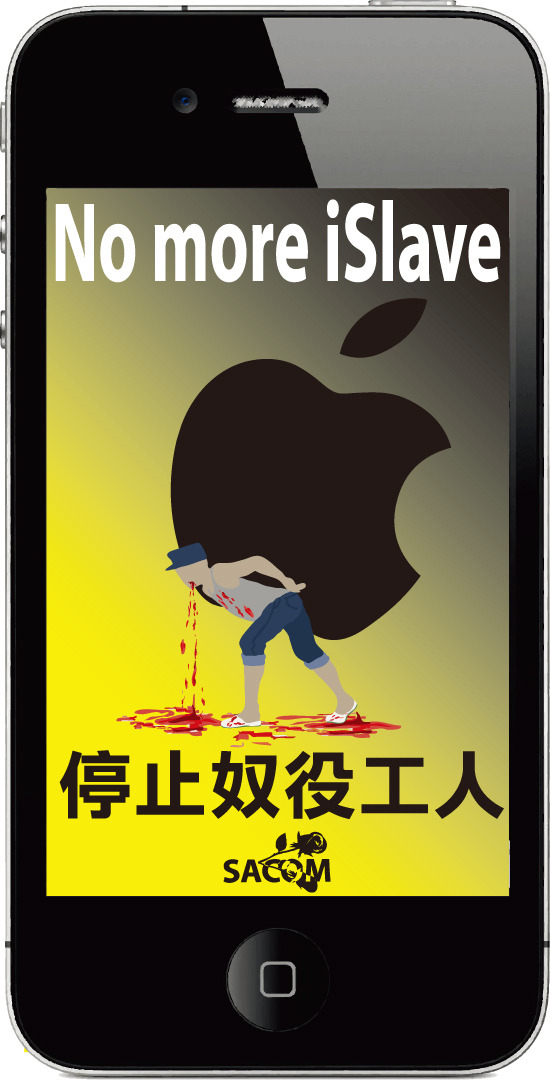iStrike: Why Should Buddhists Care About Resistance at Foxconn?
Whether from The Daily Show or the morning papers, by now everyone knows about the deplorable working conditions of Foxconn, the company that manufactures Apple products. 250,000 petition signatures, delivered to Apple in six cities back in February, seem to have done little to improve the situation. Luckily, Foxconn workers continue to take matters into their own hands. via Lauren Indvik at Mashable:
via Lauren Indvik at Mashable:
Some 3,000 to 4,000 production workers at Foxconn‘s Zhengzhou factory went on strike Friday afternoon, according to an alert sent out Friday by China Labor Watch, a not-for-profit, U.S.-based watchdog for Chinese workers’ rights.Production was halted as workers — primarily quality control inspectors — protested against a series of escalating demands. According to the group, Apple and Foxconn “raised strict quality demands on workers, including indentations standards of 0.02mm and demands related to scratches on frames and back covers” on iPhone 5 devices. When workers failed to meet the new standards, friction between quality control inspectors and workers came to a head, in some cases escalating to physical violence. Several workers were hospitalized, CLW said.Tensions were already high after employees were forced to work through a national holiday on Oct. 1.According to CLW, several iPhone 5 production lines ceased production for the entire day. It’s unclear how this will affect sales of iPhone 5 devices, which are already on backorder at Apple.Riots at Foxconn factories, which are notorious for poor, high-pressure working conditions, are not infrequent. Last month, Foxconn was forced shut down its Taiyuan plant after a brawl broke out among 2,000 workers, 40 of which were injured.Apple has often come under attack for not ensuring better work conditions at its supplier factories. The company issued an update to its Labor and Human Rights page just last week, claiming that its suppliers had achieved near-100% compliance with its demand for shorter working hours and better monitoring. The latest riots certainly put those claims into question.
Sure, okay, but isn't this kind of random, Katie? I mean, I know you seem to get hyped about strikes for some reason, but why does this matter to Buddhists?It's just a theory, but bear with me. I think that as Buddhists, we have certain superpowers that can aid today's global movements — and enrich discussions about the role of strikes.
 Buddhist Superpower: A developed sense of interconnectedness.
Buddhist Superpower: A developed sense of interconnectedness.
What It Does: Demystifies commodity fetishism.
Commodity fetishism is a fancy-schmancy term that basically means: behind the products on a shelf, or prices fluctuating in a market, there are people struggling over how they spend their time at work. Bosses want more "quality control," faster production speeds, and lower labor costs; workers want reasonable speeds, breaks, more money for themselves and their families, and to basically not be slaves.As Buddhists committed to liberation for everyone, we can use our powers of looking beyond the surface to point out the dynamics of struggle behind slick commodity marketing and the profit-based logic of capitalism. Occasionally, Business Insider makes it easy for us by summing up the contradictions:
The working conditions and pay of those who make iPhones and other gadgets will likely become an increasingly contentious issue in the coming years, especially as Apple gets ever more profitable.

Buddhist Superpower: Commitment to real peace
What It Does: Rejects false peace
To hear a lot of folks tell it, strikes are a bummer. At first glance, the opening line of the Business Insider article certainly paints the Foxconn strike that way:
If you've been waiting for iPhone 5s to become available, you may have to wait a while longer.
Fortunately the writer goes on to empathize with the Foxconn workers and the "harsh working conditions, crappy pay, and brutal hours" they endure. But still, the writer is pointing to a real dynamic: when we're on the consumer end of production (not to mention the owners' side), strikes may feel inconvenient, and it can be easy to complain about them. Why can't things go back to normal, so I can take the train / shop at Gap / use all that platinum and gold? Bosses, owners, and their friends in the media often capitalize on this tension to pit striking workers against consumers in their own community: "It's their fault your kids aren't in school / lights aren't on / garbage is left uncollected." But a Buddhist understanding of peace looks at all sides of the situation, and sees that strikes — or even riots — are not necessarily the ultimate cause, but rather the expression of unrest.Now I'm not saying all strikes are always a good idea. Or even that successful, militant, and noble ones are always a good idea! Strikes and labor gains don't seem to solve a hell of a lot, in the long run. But many still play important roles. And one of those roles is piercing the illusion of peace in a situation of exploitation. Just because workers are clocking in every day and not burning shit down, doesn't mean shit is peaceful.Buddhist teachings, I find, help us grasp nuances like that: not confusing pleasure for contentment; not confusing a busy mind for a helpful mind; and not confusing condescending sympathy for the compassion of true equals. Maybe it's our job, then, to point out, over and over, that real social peace is impossible in a system of domination.What Buddhist superpowers do you use, or see others use, in political work? :)
